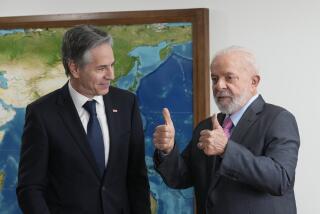Brazil Reaches Key Stage in Work on New Charter
- Share via
RIO DE JANEIRO — Brazil’s constitutional assembly has reached a decisive stage in its work on a new constitution, and the armed forces have increased the pressure to produce a document acceptable to them.
The pressure is seen by many Brazilians as proof that the military, which ruled Brazil for 21 years after a coup in 1964, did not relinquish all political power when it returned the government to civilians in 1985.
Acting as the National Constituent Assembly, Brazil’s 559-member congress has been deliberating since February. The new constitution is now taking shape in the drafting committee.
Gen. Leonidas Pires Goncalves, the army minister, recently criticized the working draft and said he was “filled with apprehension” because the assembly was dominated by an “immoderate” minority. One newspaper said the general had called the draft “unacceptable.”
Vigorous Lobbying
The armed forces have vigorously lobbied in the assembly since it began working on the constitution. But the top-ranking general’s remarks, leaked from a Cabinet meeting attended by assembly leaders, put the strongest military pressure yet on the deliberations.
Goncalves was understood to speak for the united high command of the armed forces. His statement, delivered from a prepared text, has caused a hubbub in the assembly and fueled fears of more direct military intervention.
“He is the one who can shut this place down,” assembly member Humberto Souto said.
“Leonidas pointed a collision course between the assembly and the armed forces,” the newsmagazine Veja said.
The full text of Goncalves’ speech has not been made public. But the minutes of the Aug. 27 Cabinet meeting at which he spoke quote him as saying:
“The political will of the government, of the moderate majority, does not reign in the assembly. The National Constituent Assembly today is in the hands of an active, disciplined minority, which consequently dominates the action.”
Amnesty Criticized
One provision of the draft constitution that Goncalves criticized was an amnesty for military officers who were purged for political reasons by the high command and stripped of their benefits after the 1964 coup.
He was also displeased by an article that says the armed forces will guarantee “constitutional order,” acting “at the express initiative” of the three branches of government. The present constitution, imposed under the dictatorship in 1967 and amended in 1969, says the armed forces will guarantee “law and order,” without mentioning constitutional order, and it does not say at whose initiative they will act.
Armed forces commanders are said to object to the new wording because it would reduce their legal scope of action.
Their most significant objection is to a section in the draft that would establish a parliamentary form of government. The president would be the chief of state, but a prime minister would head the government at the pleasure of a strong parliament.
An Open Feud
Since February, President Jose Sarney has engaged in an open feud with members of the assembly who want him to leave office in March of 1989, four years after he became president. Under the old constitution, Sarney’s six-year term does not end until 1991.
In May, he said he would accept a reduction of his term to five years. But he has strongly opposed any further reduction, as well as adoption of a parliamentary system.
Sarney is a member of the Brazilian Democratic Movement Party, which has a majority in the assembly. But party members accuse him of conniving with the armed forces to delay full democracy.
Sarney was not elected by popular vote. The present government was formed as a result of a compromise between the old military government and a center-right coalition of civilian politicians. For years, Sarney was the president of the party that supported the military government.
The day after Goncalves’ speech, assembly member Alfonso Arinos invited the top military commanders to lunch. He said afterward that the commanders will accept a parliamentary form of government if it does not cut short Sarney’s transitional term as president or reduce his powers.
“The military men regard the president of the republic as a representative institutional figure, indispensable to the process of transition,” Arinos said.
Sarney has made it clear that he appreciates the military support for his position. In a speech Wednesday, he praised Goncalves as “one of the firm supports of our transition to democracy.”
The struggle over what form that transition will take is expected to produce a climax or a compromise within the next 10 weeks.
More to Read
Sign up for Essential California
The most important California stories and recommendations in your inbox every morning.
You may occasionally receive promotional content from the Los Angeles Times.













